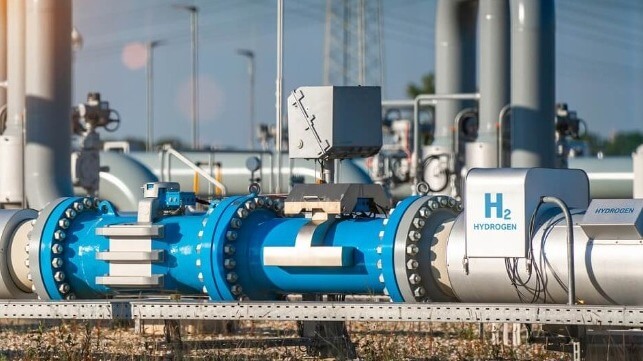Trafigura: Global South Could Power Shipping With Green Fuels
But without a global carbon levy on bunker fuel, "it doesn't happen"

In a new white paper released Tuesday, shipping executives at commodities trading house Trafigura argued that incentivizing a transition to zero-carbon marine fuels would not only help meet emissions targets - it would also create new economic opportunities in the Global South, where abundant renewable potential could be tapped to make e-fuels like green methanol and green ammonia.
Trafigura's analysis determined that Asia, South America and Africa have potential to produce abundant quantities of electrofuels. Argentina, Brazil, Chile, Colombia, Egypt, India and Morocco are particularly well-positioned for manufacturing green hydrogen, the building block of the electrofuel economy.
However, shipping as a whole is far from on track for creating a market for that fuel. Based on a business-as-usual trajectory, total emissions should roughly triple by 2050. If energy efficiency measures are implemented, emissions would still double by midcentury.
To get to a point where green bunker fuel is made and used at scale, Trafigura argues, the IMO will need to enact substantial carbon policy measures. While peripheral adjustments in the rules will help, the main tool would have to be the most controversial option available - a global carbon levy. Even the cheapest electrofuels from the most cost-efficient markets (in the Global South) will be twice as expensive as VLSFO, Trafigura predicts. At that price, they would have a hard time competing with fuel oil unless IMO taxes bunker fuel and uses the proceeds to subsidize green fuel.
Green corridors, regional (EU) regulation and voluntary uptake will all help, but "only IMO regulation can ensure global participation in shipping decarbonization," the authors argued - and only global uptake would be enough to spin up a green-hydrogen industry across the developing world.
“Delaying action will only add to the eventual cost of decarbonisation. The IMO needs to decisively move forward to tackle the shipping industry’s emissions and start the journey to a sustainable and resilient future,” said Rasmus Bach Nielsen, Global Head of Fuel Decarbonization at Trafigura and co-author of the whitepaper.
Trafigura first called for a levy in 2020, when it suggested a carbon price in the range of $250-300 per tonne CO2 (about $750-900 per tonne bunker fuel). This is among the highest proposed taxes yet published, and it would more than double the current price of conventional bunkers - closing the gap with green-fuel pricing.
The cheapest production potential for green fuels is in locations with the best renewable-power resources, and many of those sites exist in developing nations. In select sites in the Global South, high-wattage wind and solar could produce electrofuels at a cost in the range of $750 per tonne, Trafigura estimates. This is much less expensive than the expected production cost in Europe, where it would be about $1,200-1,500 per tonne.
Sub-Saharan Africa could be the biggest winner in an energy shakeup. Its maximum green-fuel production potential is equal to that of Australia, the Middle East and South America combined. Between all of these four regions, there is enough renewable-power potential available to fuel shipping 100 times over, Trafigura concluded - if the right carbon policies are enacted at IMO. And if the industry is to spool up to meet a five percent green-fuel target by 2030 - a realistic goal, according to Nielsen - that carbon policy would have to be enacted by 2025, putting pressure on IMO MEPC 80 this summer.

that matters most
Get the latest maritime news delivered to your inbox daily.
"If you can summarize it, it's not a technology problem; the potential [fuel] supply is there; we believe that the demand is there in order to meet Paris [Agreement]; the financing is there; so what's missing is the consensus on carbon pricing," said Margaux Moore, head of energy transition research at Trafigura. "We do need a price on carbon in order to support the adoption of these low-carbon fuels. Without it, it doesn't happen."
